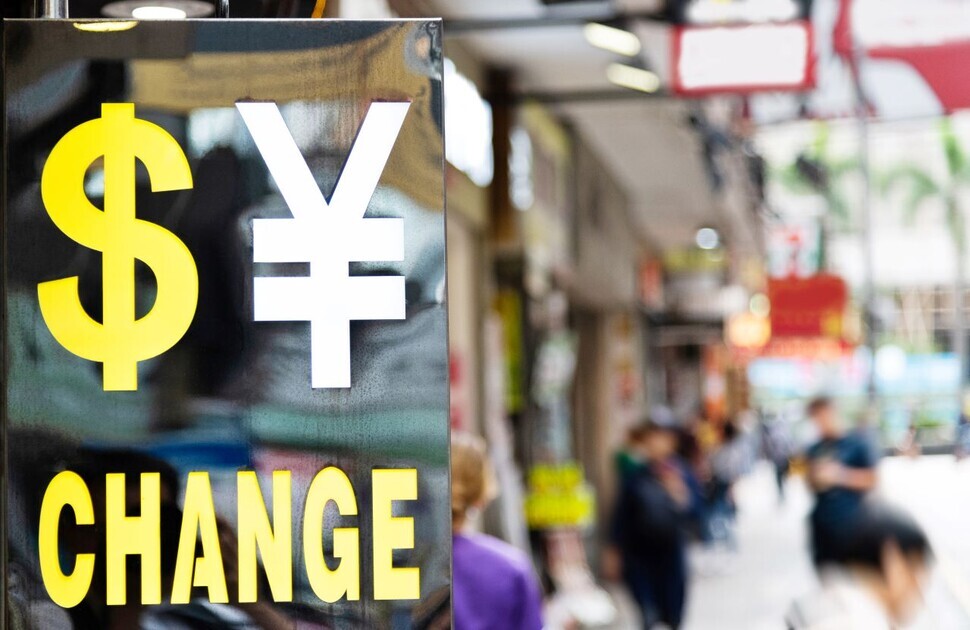hankyoreh
Links to other country sites 다른 나라 사이트 링크
Korean students in US agonize over soaring exchange rate

“My rent has gone up 35% from last year, and eating out costs more than US$30. On top of that, the exchange rate keeps getting higher and higher. My heart skips a beat when I convert my living costs into won,” said a 23-year-old surnamed Lee, who left Korea in 2013 and is currently studying at a private university in New York.
Lee said he’s recently been exploring various ways to cut his food and transportation costs. New York has always been a pricey place to live, but surging prices coupled with a climbing exchange rate have made it tough for Lee to cover expenses with the money he gets from back home in Korea.
“I avoid eating out as much as possible and try to fix my own meals at home. When going to school or elsewhere, I generally use a bike sharing program that costs US$200 a year,” he said.
On Wednesday, the value of the Korean won climbed above 1,440 won to the dollar for the first time in 13 years and six months.
With the US consumer price index reporting an 8.3% year-over-year increase in August, Koreans studying abroad are dealing with something similar to what their parents faced in the Asian financial crisis of 1997 and what the previous generation of students faced in the global financial crisis of 2008.
For now, these students are finding creative means to make ends meet, but they all agree that things aren’t easy.
The first problem is school tuition. The Biden administration has announced plans to forgive up to US$20,000 in student loans, but that’s not an option for foreign students.
Even a small increase in the exchange rate presents a major burden. That’s also true at state universities, which tend to have lower tuition than private universities.
“I couldn’t pay my semester tuition of US$15,500 up-front, so I have to make four installments,” said Song Ki-hoon, 24, a student at Purdue University.
“But with the exchange rate rising so fast, I’m not sure what to do about my next installment. I’ll have to pay 2.16 million won more than when I made my calculations back in August.”
Lee Jae-hui, 22, who is studying at Arizona State University, has had a similar experience. “Not only is the exchange rate on the rise,” they said, “but the cost of studying abroad, including tuition, has gone up around US$10,000 since the pandemic. Since students like me are dealing with a high exchange rate and rising prices at the same time, we have no choice but to cut our expenses as much as possible.”

People like Cho Yeong-ji, a 30-year-old student at the State University of New York, are coming up with all kinds of ways to trim their budgets.
“As a student, about the only area where you can cut costs is food. I only eat out about once every two weeks. If something comes up and I have to eat away from home, I pack a lunch box with leftovers to take with me,” Cho said.
A 23-year-old student at a state university surnamed Kwon said she has to fix meals at home because she can’t afford to eat at the school cafeteria.
“Since textbooks for my major cost around US$300 per book, I’ve been buying used copies from a community website at my university,” Song Ki-hoon said.
Exchange students may only be staying in the US for a short time, but they’ve also been shocked by the constantly rising exchange rate and the unexpectedly high prices.
A 24-year-old exchange student surnamed Lee has been at a university in the US since September. “I changed 500,000 won into dollars for each month when I came over, but now that I’m here, prices are so high that I can’t afford any extra spending,” Lee said.
“Since my parents aren’t in a position to send more money given the high exchange rate, I’ve canceled some travel plans and am eating all my meals at my dorm cafeteria, which is relatively cheap. I drink coffee here, too,” Lee said.
While people on a student visa aren’t allowed to do part-time work off-campus, some have landed under-the-table jobs in an attempt to cover some of their living expenses.
“Each month, my parents send me 1 million won. Back in January, I could convert that to US$830, but now it isn’t even worth US$713,” said “K,” who has been an exchange student at a state university in the US for 10 months now.
“Since my rent has also gone up about 10%, I’ve been doing part-time work since it makes more sense to earn money in-country.”
By Ko Byung-chan, staff reporter
Please direct questions or comments to [english@hani.co.kr]

Editorial・opinion
![[Guest essay] The real reason Korea’s new right wants to dub Rhee a founding father [Guest essay] The real reason Korea’s new right wants to dub Rhee a founding father](https://flexible.img.hani.co.kr/flexible/normal/500/300/imgdb/original/2024/0423/8317138574257878.jpg) [Guest essay] The real reason Korea’s new right wants to dub Rhee a founding father
[Guest essay] The real reason Korea’s new right wants to dub Rhee a founding father![[Column] ‘Choson’: Is it time we start referring to N. Korea in its own terms? [Column] ‘Choson’: Is it time we start referring to N. Korea in its own terms?](https://flexible.img.hani.co.kr/flexible/normal/500/300/imgdb/original/2024/0423/3617138579390322.jpg) [Column] ‘Choson’: Is it time we start referring to N. Korea in its own terms?
[Column] ‘Choson’: Is it time we start referring to N. Korea in its own terms?- [Editorial] Japan’s rewriting of history with Korea has gone too far
- [Column] The president’s questionable capacity for dialogue
- [Column] Are chaebol firms just pizza pies for families to divvy up as they please?
- [Column] Has Korea, too, crossed the Rubicon on China?
- [Correspondent’s column] In Japan’s alliance with US, echoes of its past alliances with UK
- [Editorial] Does Yoon think the Korean public is wrong?
- [Editorial] As it bolsters its alliance with US, Japan must be accountable for past
- [Guest essay] Amending the Constitution is Yoon’s key to leaving office in public’s good graces
Most viewed articles
- 1[Column] ‘Choson’: Is it time we start referring to N. Korea in its own terms?
- 2Senior doctors cut hours, prepare to resign as government refuses to scrap medical reform plan
- 3Why Korea shouldn’t welcome Japan’s newly beefed up defense cooperation with US
- 4Opposition calls Yoon’s chief of staff appointment a ‘slap in the face’
- 5[Guest essay] The real reason Korea’s new right wants to dub Rhee a founding father
- 6Terry Anderson, AP reporter who informed world of massacre in Gwangju, dies at 76
- 7[Column] The clock is ticking for Korea’s first lady
- 8[Editorial] Japan’s rewriting of history with Korea has gone too far
- 9New AI-based translation tools make their way into everyday life in Korea
- 10Survey: S. Koreans spend more time using smartphones than eating